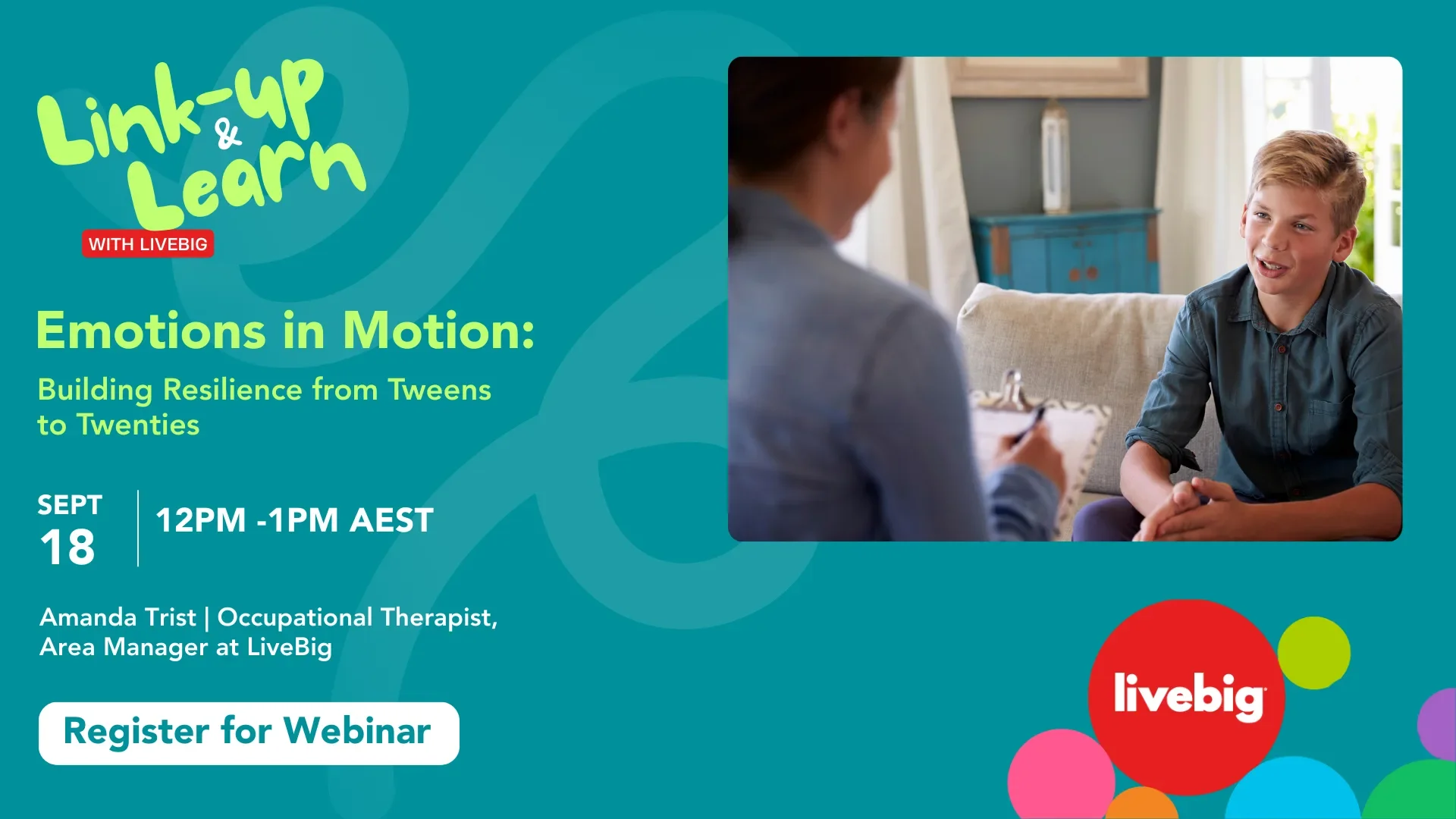FREE WEBINAR: Understanding Big Emotions
This is a great resource to utilise to help your child if they struggle with emotional regulation.
LiveBig — a specialist allied health provider supporting people with disability, including those on the NDIS - is hosting a free national webinar to give parents, carers, educators and support workers practical tools to support teens with autism, disability or mental health challenges.
Emotions in Motion: Building Resilience from Tweens to Twenties
When: Thursday 18 September, 12–1pm AEST
Register free: www.livebig.com.au/event/emotions-in-motion-webinar-emotional-regulation-teens-young-adults/
Occupational Therapist Amanda Trist will unpack emotional regulation — why it matters and how small, evidence-based strategies can ease anxiety, prevent meltdowns and build confidence.
This free webinar for parents and caregivers, allied health professionals, educators, support workers and youth mentors will unpack the science and evidence-based practice of emotional regulation and why it matters.
If you’re parenting a tween or teen who slams the door when plans change, avoids school because of anxiety, or becomes upset over what seems like a small setback — you’re not alone. For many families raising young people with autism, intellectual disability or mental health challenges, these moments can be part of daily life. With the right support, they can also become opportunities for growth and resilience.
The latest Mission Australia Youth Survey shows that over one in five young people (22%) are experiencing high psychological distress, with many reporting challenges related to stress, anxiety, loneliness and depression.¹ For those with disability or additional challenges, these pressures can be even harder to navigate.
Occupational Therapist Amanda Trist, Area Manager with LiveBig — a specialist allied health provider supporting people with disability, including those on the NDIS — says these behaviours are often misunderstood.
“Parents sometimes blame themselves or feel their child is just being difficult, but what’s really missing is a skill set,” Ms Trist explained. “Emotional regulation — the ability to recognise and manage strong feelings — doesn’t always develop on its own. For many young people we work with, it needs to be taught and practised step by step.”
Why emotional regulation matters
For tweens and teens with additional challenges, emotional regulation is the foundation for daily life and a key building block of resilience. It supports everyday routines like getting dressed and getting to school, eases transitions such as moving into high school or TAFE, and strengthens friendships and family relationships. Most importantly, it helps reduce stress and anxiety, prevent meltdowns, and build confidence and independence.
“When a young person can pause, reset and choose how to respond, it can transform their daily experience,” Ms Trist said. “And the benefits are felt not just by them, but by their parents, siblings, teachers and friends.”
What families can do
Amanda emphasises there is no single formula and every child responds differently, and strategies need to be tailored to their strengths and interests.
“The key is to meet young people where they are,” Ms Trist said. “For some, it’s physical activity like walking or heavy work. For others, it’s sensory tools like a weighted blanket or a quiet space. The strategies must be tailored to the child — that’s when resilience starts to grow.”
Examples of approaches families can begin with include:
For routine-driven kids: Practise gentle flexibility, like shifting dinner time by ten minutes with reassurance.
For teens who bottle things up: Use emotion charts, colours or journals to help them express feelings in safe ways.
For those who escalate quickly: Teach them to spot early warning signs and practise calming tools like square breathing when calm.
For avoidant young people: Break tasks into smaller steps, building confidence gradually.
“Parents don’t have to do this alone,” Ms Trist added. “With the right support and strategies, we can lighten the load and create a calmer, more confident future for their child.”
Free webinar: practical tools for parents, carers and professionals
LiveBig is hosting a free national Link up and Learn webinar — Emotions in Motion: Building Resilience from Tweens to Twenties — on Thursday 18 September, 12pm–1pm AEST.
Participants will learn:
• What emotional regulation really means and why it matters
• How poor regulation affects friendships, study, work and mental health
• A step-by-step framework for building emotional awareness and control
• Practical tools and techniques to support regulation in everyday life
• How allied health disciplines — psychology, occupational therapy, speech pathology and behaviour support — can work together to build resilience
This person-centred, strengths-based session is designed for parents and caregivers, allied health professionals, educators, support workers and youth mentors. Whether you’re helping a young person transition to TAFE, strengthen friendships, or gain independence, you’ll leave with evidence-based strategies and renewed confidence.
Registration is free at www.livebig.com.au/event/emotions-in-motion-webinar-emotional-regulation-teens-young-adults/
About LiveBig
LiveBig is a specialist allied health and assessment services provider for people with disability, including those on the NDIS. LiveBig is registered with the NDIS Quality and Safeguards Commission. LiveBig simplifies the process of accessing support services at home, via telehealth, and in the community. LiveBig is part of the Arriba Group, which includes Rehab Management, AimBig Employment, and LiveBig. For more information, visit www.livebig.com.au.
